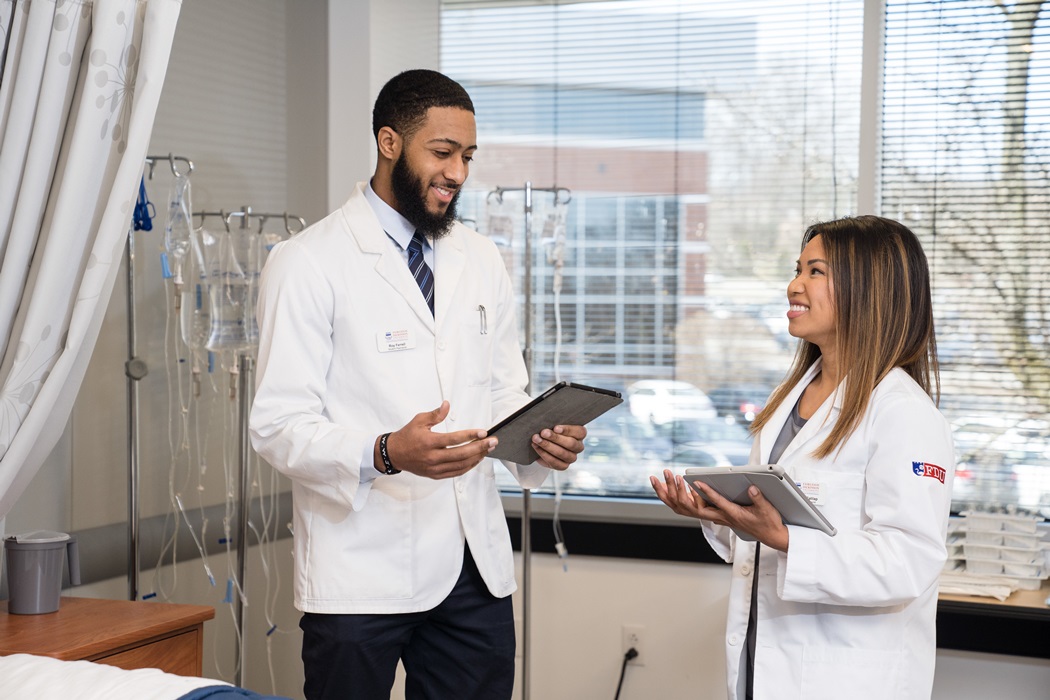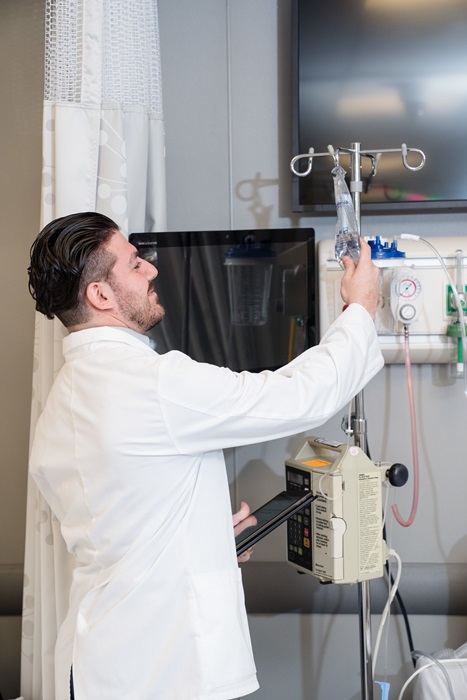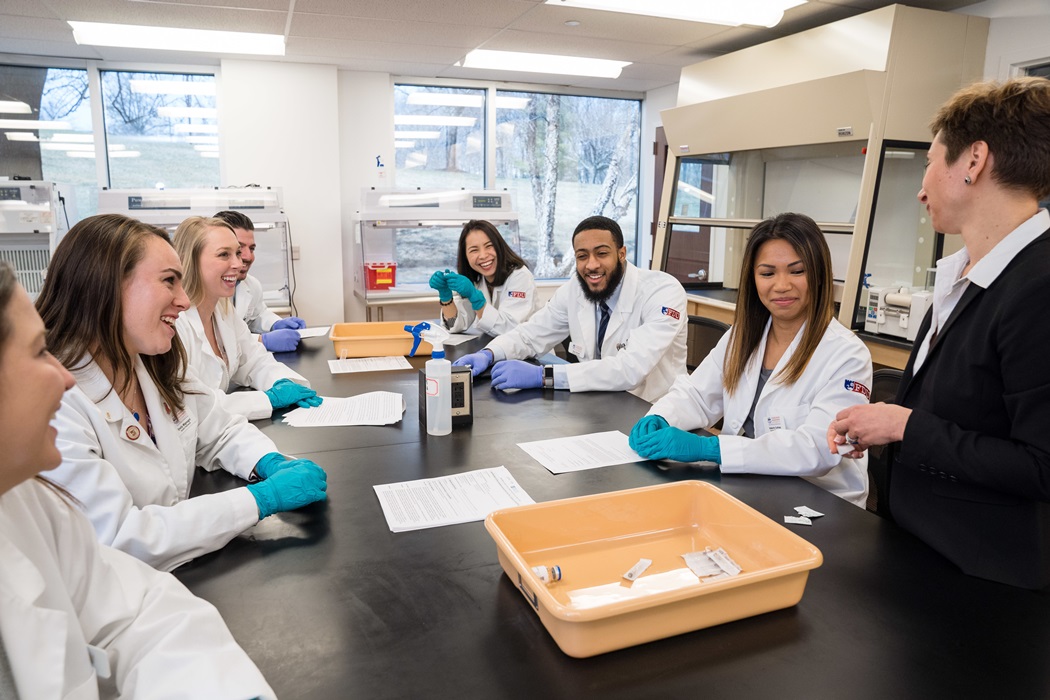The Fairleigh Dickinson University School of Pharmacy and Health Sciences was founded on the premise that creating and building a new program could provide an educational experience to prepare students for the revolutionary changes in the way in which healthcare is practiced now and in the future.

The advent of technological innovation and breakthroughs in new modes of treatment, the onset of personalized medicine and the rapidly changing face of healthcare delivery are all factors that were considered when building the School of Pharmacy and Health Sciences.
Through unique degree offerings and combinations, hands-on clinical experiences and a personalized, interprofessional delivery of the curriculum, the School is focused on preparing future leaders for diverse roles across the healthcare continuum through a culture of learning, scholarship, innovation and advocacy.
The focus of the School is to integrate all of its health science offerings around a common core mission, vision and set of values to assure that leadership, faculty, staff and students all focus on the common mission of educating future healthcare leaders to address the uniquely evolving challenges and opportunities facing our society now and long into the future.
The mission of FDU’s School of Pharmacy & Health Sciences is to create a values-based, student-centered learning experience that prepares graduates who are committed to improving the health of individuals and populations through leadership roles in pharmacy practice, healthcare research and related healthcare fields.
Students within our program are exposed to a breadth of courses and experiences to reinforce these five core values, which include:
- THINK critically, analyze data, detect and solve problems on a path through lifelong learning.
- COMMUNICATE knowledge, skills and the confidence to practice pharmacy as an ethical professional and leader.
- ADVOCATE and participate as a team member on an interprofessional team that may consist of physicians, nurses, pharmacists, ethicists, other health professionals and patients.
- LEAD for individual patients and patient populations through the practice of pharmacy.
- IMPLEMENT the safe and effective medication therapy management that individualizes patient care and ensures adherence, and supports the ideas of prevention and wellness.

The Fairleigh Dickinson University pharmacy program was created to provide students an opportunity to advance the practice of pharmacy in both traditional and non-traditional settings.
The school was founded on the premise that the role of the pharmacist is advancing beyond a dispensing function and into a clinical decision-making role that puts pharmacists as essential members of the healthcare decision-making team.
As a program educating future pharmacists and leaders, it is our goal to instill a set of five core values into each student and graduate of our program. We believe that these five, non-negotiable tenets must be a part of every pharmacist in practice today and in the future as they seek to advance healthcare practice to a more patient-centered, personalized approach.
Additionally, a unique aspect of the program that has provided tremendous value to students includes the dual-degree opportunity for students who are eligible and qualify. During the four years within the program, eligible students have the opportunity to pursue their Doctor of Pharmacy degree alongside a master’s degree that aligns closely with their skills and interests.
Students may select from a dual degree Master of Business Administration (MBA), Master of Public Health (M.P.H.), Master of Public Administration (MPA), Master of Arts in Industrial/Organizational Psychology or Master of Arts in Communication Studies.
By aligning these master’s courses with their existing curriculum, students receive both degrees concurrently, aligning their learning from both courses of study to synergistically overlap and provide opportunities for real-life application of their coursework.
Pharmacist graduates of our program are well equipped to pursue opportunities in community, clinical and industry pharmacy through a wide array of learning experiences across the clinical year of the program, providing for a set of experiences that are both customizable and widely reaching.

Students learn alongside subject matter experts and leaders to garner a knowledge and understanding of what areas of pharmacy align with their interests and strengths. This effectively prepares them to emerge as leaders and agents of change within a wide array of opportunities.
Graduates readily enter into practice with vastly-reaching opportunities and pursue jobs in community pharmacy, hospitals and health systems, the pharmaceutical and biotechnology industries and in other unique and emerging areas where they can bring value.
The Master of Public Health (M.P.H.) Online Program at Fairleigh Dickinson University seeks to educate leaders who promote, enhance, and improve the health of individuals and populations in local, national, and global settings. In alignment with the University’s global mission of training world citizens, the M.P.H.
program will focus on ways to enhance access to health promotion services, understand the ethical and social responsibility for providing access to healthcare while minimizing or eliminating health disparities, and to understand the role of the public health practitioner as a leader and advocate with both a local and global perspective.
The program is focused on incorporating the five core values of health science programs within the University to prepare confident public health experts who, in turn, will engage with the patients and populations they treat and serve.
The M.P.H. degree requires completion of 45 credits, including a didactic core courses, specialization track electives, and a culminating experience: practicum and capstone. The specialization tracks include areas of Health Analytics, Health Policy, Population Health in Addiction and Recovery, or students may opt for a Generalist track and pursue elective courses in any combination of these three areas.

The teaching and learning will be focused on inclusion of active learning activities that include small group interactions, case studies, flipped classroom pedagogy, as well as integrated care groups that are focused on interprofessional education with students in pharmacy, nursing, psychology, and other health profession programs.
A critically important aspect to the program includes an interprofessional, team-based approach to learning that includes regular interactions with students from other health professions to focus on incorporating the Interprofessional Education (IPE) plan set forth by the School of Pharmacy and Health Sciences and adopted across the health professions (IPEC, 2016; WHO, 2010).
The mission of this interprofessional education (IPE) plan is to bring together members of the care team to build relationships and facilitate discussions, to develop best-practice approaches for innovative and effective methods of interprofessional (interprofessional) practice.
The goal is to educate current and future health professionals with focus on collaboration, respect and ethics toward the promotion and delivery of patient-centered, team-based decision making. The M.P.H. program also utilizes the University’s extensive healthcare partnerships to leverage high quality experiences as part of its longitudinal practicum and capstone experience.
The penultimate goal of this experientially focused portion of the curriculum is to provide students an immersive, hands-on experiential learning focused on real-life public health problem solving and decision making, analysis and understanding of unique challenges within different areas of public health, and a comprehensive exposure to applications that reinforce concepts learned in classes and applied to practice.

Students are provided an opportunity to present their experiences as part of the comprehensive capstone course, which will connect experiential learning to the five core values of the program.PAs are medical professionals that improve healthcare access and quality, practicing in every state, setting, and specialty.
They diagnose illness, develop and manage treatment plans, prescribe medications, and often serve as patients’ principal healthcare providers. ( AAPA)The Bureau of Labor Statistics projects the employment of PAs to grow faster than for all other occupations.
Data released by the Association of American Medical Colleges indicates that the shortage of physicians could climb as high as 120,000 by 2030 and in response to that shortage and other factors, the PA profession is predicted to grow by 72% by 2025 (Public Health Reports).
The FDU PA Program has developed a 2.5 year curriculum leading to the Master of Science (MS) in Physician Assistant Studies. The mission of the FDU PA Program is to “ prepare future PAs, socially responsible members of inter professional teams, empowered to promote health, provide compassionate patient-centered care, and advocate for the well being of local and global communities”.
The curriculum encompasses a 44 week ( excusing vacation and holidays) Didactic Phase followed by 65 weeks of Clinical & Advanced Clinical Phases. Learning experiences are designed to promote the acquisition of bouts sound academic knowledge and competent clinical skills.

Clinical experiences are provided in a variety of healthcare settings with diverse patients across the lifespan. The program fosters professional attitudes, adherence to ethical standards, and commitment to patient-centered care; and has developed for its students ( included in the tuition) local and global service learning opportunities.
The PA Program also guides students in the development of research studies that culminate in the dissemination of findings and prepares its graduates to successfully obtain national certification and state licensure(s). Throughout, it cultivates a commitment to lifelong learning and service.
FDU has applied for Accreditation-Provisional from the Accreditation Review Commission on Education for the Physician Assistant ( ARC-PA) and anticipates matriculating it’s first class in June 2011, pending achieving Accreditation-Provisional status at the September 2030 ARC-PA meeting.
The post-professional Occupational Therapy Doctorate (PPOTD) program at Fairleigh Dickinson University, slated to begin summer 2020, will seek to educate practitioners who support and assist patients limited by physical, social, developmental, cognitive or other disabilities or challenges as they work to optimize their health and wellness through development, recovery, maintenance and improvement of the daily skills needed for living.
The program will be focused on incorporating the five core values of health science programs within the University to empower practitioners who, in turn, will empower the patients they treat and serve.
The PPOTD curriculum will include both didactic, laboratory and experiential courses and will be focused on inclusion of active learning activities that include, but are not limited to, small group interactions, case studies, flipped classroom methodologies and integrated care groups that are focused on interprofessional education alongside students in pharmacy, physician assistant studies, nursing, psychology and other health professions programs planned for the future.

Acritically important objective within the program is to offer an interprofessional, team-based approach to learning that includes regular interactions with students from other health professions to focus on incorporating the interprofessional education plan set forth by the School of Pharmacy and adopted across the health professions.
The mission of this interprofessional education plan is to bring together members of the care team to build relationships, facilitate discussions and develop best- practice approaches for innovative and effective methods of interprofessional practice.
The goal is to educate current and future health professionals who are focused on collaboration, respect and ethics toward the promotion and delivery of patient-centered, team-based care.
The PPOTD program will also focus on providing students with a breadth and scope of practice knowledge across the continuum of care to assure that students become well-rounded, cross-functional health professionals who understand the role of the occupational therapist in a multitude of settings.
The plan is also in place to provide interprofessional experiences throughout the program to afford students the opportunity to “round” and practice alongside other health professionals to apply the knowledge and understanding of the role of each practitioner that was learned during the didactic courses into real world contemporary practice.













